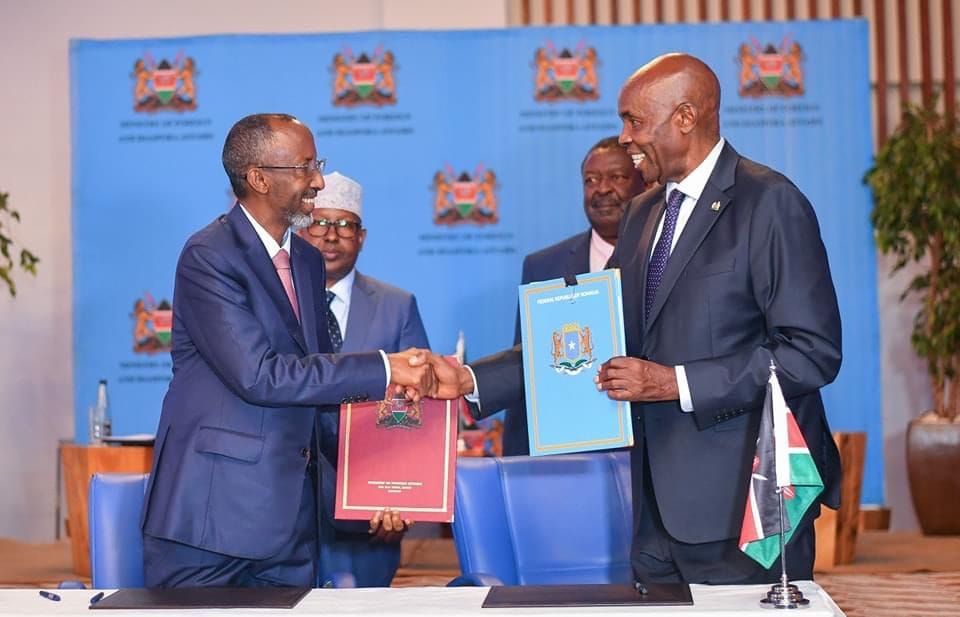Kenyan Universities Open Doors to Somali Students Amidst Pressing Educational Needs

Source: Wakaaladda Wararka Soomaaliyeed
Nairobi, SONNA - In a significant move poised to transform the educational landscape for Somalia's youth, Kenyan universities have opened their doors to students from Somalia who hold high school diplomas accredited by the Ministry of Education of the Federal Government of Somalia. This unprecedented initiative provides Somali students with a pathway to quality higher education, offering them a chance to hone their skills and contribute to their nation's development.
Over the past three decades, Somalia has been fraught with civil war and internal conflict, leading to the erosion of its socio-economic fabric and a dire scarcity of skilled professionals. This tumultuous period significantly hindered educational progress, leaving a substantial gap in the country's ability to nurture and retain talent. Now, however, as Somalia steadily emerges from these challenges, this opportunity at Kenyan universities represents a critical turning point for young Somalis.
The importance of higher education cannot be overstated for Somalia, particularly given the urgency of revitalizing its development and technology sectors. Access to Kenyan universities equips Somali students with the technical expertise and specialized training required to address these pressing national needs. Moreover, the cross-cultural exposure and academic rigor offered by these institutions will help prepare students to tackle challenges that transcend borders, creating a generation of versatile and globally minded professionals.
In an era where nations increasingly depend on technology for socio-economic growth, Somalia must focus on bolstering its IT sector to drive innovation and digital transformation. Kenyan universities, many of which rank among the best in the region, have become hubs of information technology education. Somali students can now benefit from their well-established IT programs, allowing them to fill key gaps in their homeland's rapidly evolving technological landscape.
The opportunity, however, does not come without challenges. Language barriers, financial constraints, and cultural adjustments could potentially hinder the experience. It will be crucial for Kenyan universities to provide comprehensive support systems, such as preparatory language courses and peer mentorship programs, to ensure smooth assimilation.
In addition, both governments and relevant stakeholders must ensure that scholarship programs are robustly funded. This would especially benefit students from marginalized backgrounds and contribute to closing the education gap that exists due to economic instability in Somalia. Kenya and Somalia could also explore joint research initiatives that directly address the developmental needs of both countries.
In addition to the economic challenges, navigating bureaucratic processes, and adapting to a new cultural and academic environment can be difficult. Proper support structures, such as mentorship programs and student organizations, will be crucial for helping these students acclimate.
This initiative not only transforms individual lives but has the potential to uplift Somali society as a whole. Graduates equipped with Kenyan university degrees can return to Somalia with the knowledge, experience, and vision required to innovate and revitalize key sectors. Whether they pursue careers in government, non-profit organizations, private industry, or academia, these individuals can help rebuild Somalia's economy and strengthen its social fabric.
Moreover, the collaboration between Somalia and Kenya in higher education exemplifies the value of regional partnerships in addressing global issues. Kenya, with its robust academic infrastructure, is well-positioned to support Somalia's educational revitalization while fostering deeper political and socio-economic ties. This partnership will undoubtedly lead to enhanced bilateral relations and the exchange of ideas that could positively shape the region's future.
In this initiative reflects a commitment to fostering regional stability and promoting sustainable development. Kenyan universities' willingness to accept Somali students with high school diplomas from their Ministry of Education signifies a shared vision for regional growth and unity. By unlocking new educational opportunities for Somali youth, both nations are laying the groundwork for a more prosperous and harmonious future.
While obstacles remain, the benefits of this collaboration far outweigh the challenges, presenting an unprecedented opportunity for Somali students to pursue their dreams and help steer their country toward recovery and development. The journey toward a brighter future begins with education, and these young minds hold the promise of an era where Somalia's potential can finally be realized.
Moreover, the collaboration exemplifies the spirit of regional integration that the EAC envisions, creating a more interconnected, resource-sharing bloc where students from different backgrounds can thrive. In this sense, the educational exchange between Kenya and Somalia could become a model for the entire East African region, unlocking new economic and social opportunities for generations to come.
The partnership between these neighboring countries is a testament to what is possible when two nations unite for a common purpose. In the words of Nelson Mandela, "Education is the most powerful weapon which you can use to change the world." It is this powerful weapon that Somalia aims to wield in reshaping its destiny and securing a brighter future for all its citizens.



